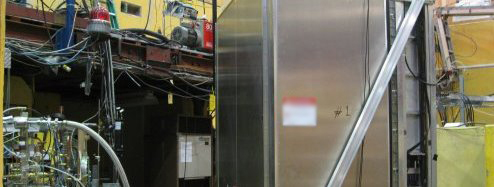
In October, the T2K (Tokai to Kamioka) neutrino experiment began tests of the T2K near detector's tracker in TRIUMF's M11 beamline. These tests mark a major milestone for T2K, which will begin taking data in Japan in 2009.
Neutrinos are fundamental subatomic particles that interact with matter through the weak force only. They can be produced when nucleons decay inside a nucleus, with most neutrinos produced by nuclear reactions occurring naturally in the sun. Until recently, neutrinos were thought to be massless and to permanently maintain their identity as one of three types, or flavours. However, experiments such as the ones performed at the Sudbury Neutrino Observatory discovered that neutrinos have mass and also change, or oscillate, from one flavour of neutrino to another. This neutrino oscillation is evidence for physics beyond the standard model.
T2K is a long-baseline neutrino experiment that will study neutrino oscillation in unprecedented detail. An intense neutrino beamline is currently under construction at the J-PARC accelerator complex in Tokai, Japan. This beamline will be used to direct a beam of muon neutrinos towards the Super-Kamiokande detector located 295km away in the Kamioka mine in western Japan. By comparing the neutrino flux and energy spectrum at its production point to that observed at Super-Kamiokande, the number of neutrinos that undergo flavour oscillation, and the energy dependence of this effect, can be determined with high accuracy.
The Canadian T2K group is responsible for building the tracker for T2K's near detector. This near detector, located 280 meters from the beamline's hadron production target, will measure the neutrino beam properties before the neutrinos have had a chance to oscillate. The tracker consists of large time projection chambers (TPCs) and fine-grained scintillator detectors (FGDs), and measures charged particles produced from neutrino interactions. Neutrinos will interact in the scintillator, which provides target mass and tracking of short-ranged particles, while penetrating particles will have their trajectories measured in the accompanying time projection chambers. The TRIUMF group is responsible for the mechanical design and construction of both types of detectors, as well as the TPC's gas and calibration systems and the FGD's electronics.
The tests in the M11 beamline are intended to verify the performance of these new detectors and to calibrate their responses to a variety of particle species over a range of momenta. Following completion of these beam tests, the detectors will be moved to Japan in the summer of 2009 for installation in Tokai.
T2K Canada consists of groups at TRIUMF, Victoria, UBC, Alberta, Regina, York, and Toronto. The T2K collaboration includes groups from Japan, Canada, the US, Europe, and Russia.
By Scott Oser, UBC Associate Professor
Kaitlan Huckabone
TRIUMF's Communications Assistant
